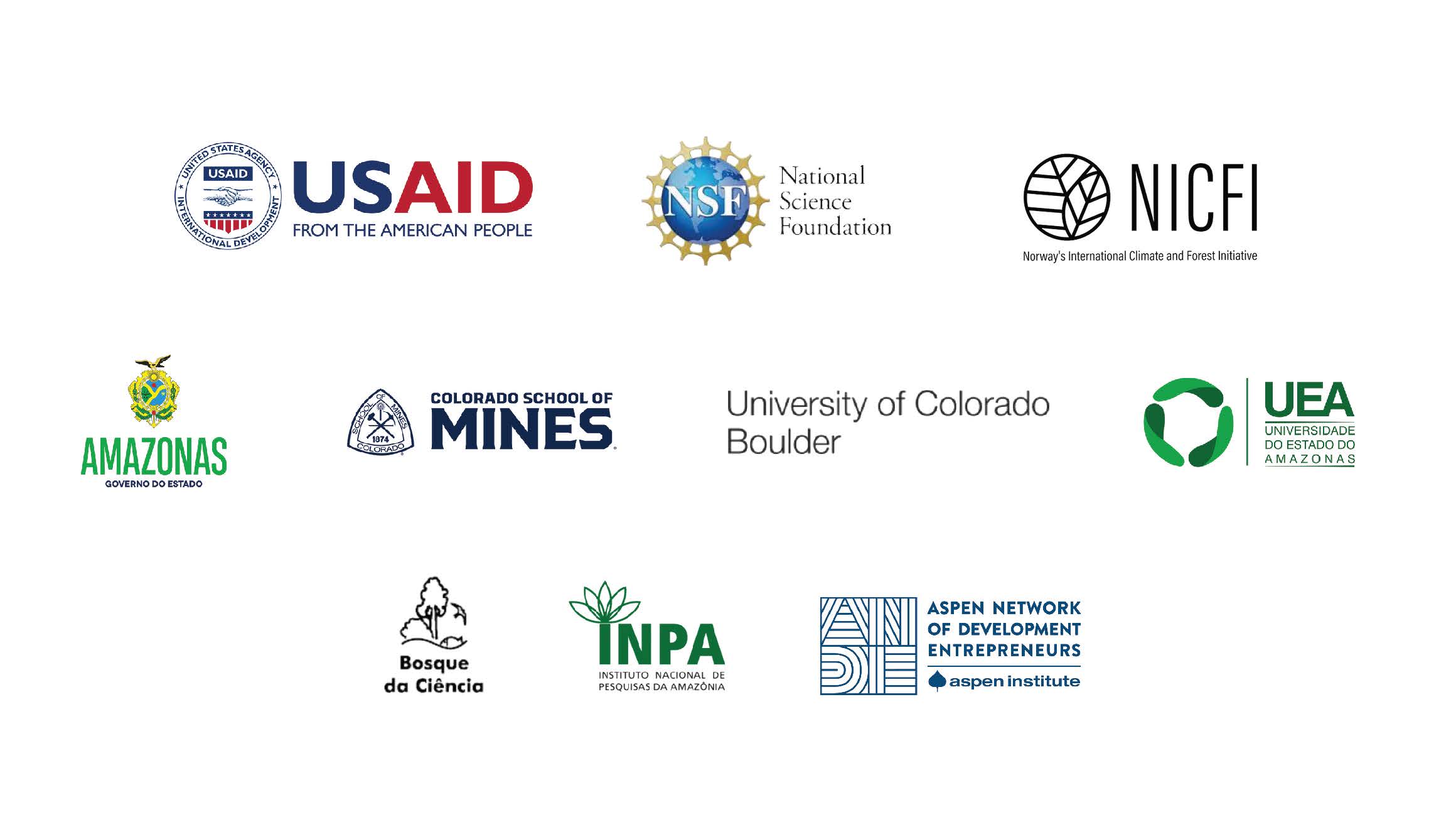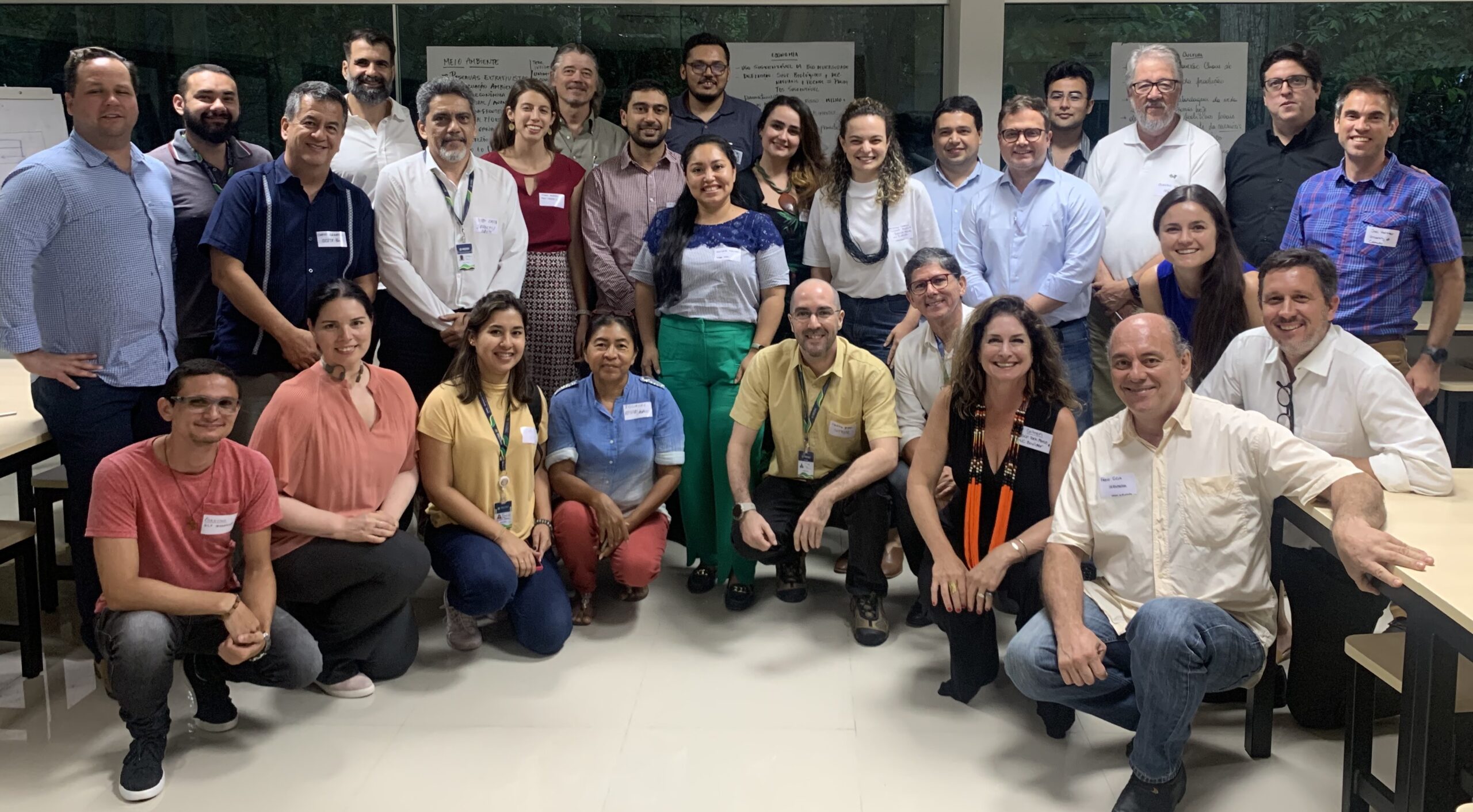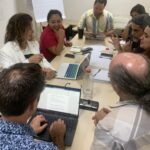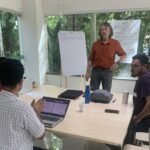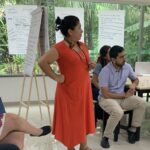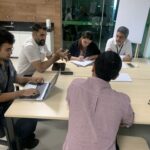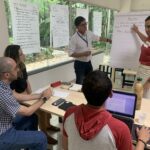The GCF Task Force’s first cross-sector “Pilot Bioeconomy Planning Workshop” was held in Manaus, Amazonas (Brazil) on July 12-13, 2023 with funding support from USAID, the US National Science Foundation’s PIRE grant, and NICFI. The agenda and participants list is available here.
This workshop assembled a “community of practice” (COP) comprised of leaders from state government, the private sector, academia, and civil society, including representatives of Indigenous Peoples and traditional riverine communities. Over the course of two intense days, the COP members worked together focusing on a singular goal: to begin to envision and chart a course of action for helping the State of Amazonas consider transitioning from a traditional, “business as usual” economic model to a state-wide bioeconomy model.
This initial workshop served as an experimental testing ground in two senses. First, it elicited information that was contextually specific and important for the State of Amazonas as the it embarks on developing an integrated, robust, and durable bioeconomy strategy as one of its commitments to the Manaus Action Plan, which was born at the GCF Task Force meeting in Amazonas in 2022. Second, this two-day workshop served as an initial “proof of concept” for how a diverse group of actors could come together, coalesce, and emerge with initial ideas and tasks that will be completed over a relatively short time frame of six months’ time.
Jose Mattos of the Aspen Network of Development Entrepreneurs (ANDE) facilitated a unique methodology called “Transformative Scenarios,” which challenged workshop participants to explore possible and desirable futures to transform complex systems, such as the state’s economic matrix while considering its unique social-cultural and environmental characteristics.
This process began with a morning of setting the context for the State of Amazonas, with brief overviews by state Secretaries of the Environment – SEMA (Eduardo Taveira), of Development, Science, Technology and Innovation – SEDECTI (Jeibi Madeiros da Costa), and of Rural Production – SEPROR (Petrucio Pereira de Magalhães Júnior), complemented by brief presentations by academic experts on the social-cultural and economic landscapes of the State of Amazonas.

Opening session of the Pilot Bioeconomy Planning Workshop for the State of Amazonas. July 2023. Left to right: Colleen Scanlan Lyons (GCF Task Force Global Secretariat Project Director; UCBoulder Professor / MENV), Alexandre Alves (USAID Private Sector Engagement Specialist/Partnership Development), Petrucio Pereira de Magalhães Júnior (Secretary – SEPROR, Amazonas), Eduardo Taveira (Secretary – SEMA, Amazonas), Jeibi Medeiros da Costa (Executive Secretary – SEDECTI, Amazonas), Antonio Mesquita (Universidade do Estado do Amazonas Professor), Jose Mattos (Facilitator/ANDE).
From that point on, COP members fully participated throughout the rest of the two day-workshop. They engaged in a series of interactive exercises that challenged them to collectively think outside the box and, by doing so, to begin outlining the myriad steps, actors, institutions, and processes for developing a state-wide “bioeconomy blueprint” which can serve as a basis for the policies and investments needed to make a transition toward a bioeconomy model.
Working groups. Pilot Bioeconomy Planning Workshop for the State of Amazonas. July 2023.
The workshop successfully concluded with five different working groups (synthesis, executive summary, business chamber, political articulation, and technical partnership) that over the next two months will continue working on a draft bioeconomy policy document, reconvening in late October 2023 to validate said document and gain additional input from governmental, academic, business, and civil society leaders. The bioeconomy policy plan is anticipated to be presented at the 28th Conference of the Parties (COP28) of the United Nations Framework Convention on Climate Change in Dubai in early December 2023.
It is also important to note that, concurrently, this methodology will be repeated in another GCF Task Force member jurisdiction in Peru in the Fall of 2023. In sum, assembling a small, agile COP in GCF Task Force jurisdictions to conduct focused planning in a short period of time is a model that is contextually specific, adaptable, replicable, cost-effective, and time efficient.
Finally, we thank our participants who engaged in the co-creation of this workshop, as well as our generous supporters and partners: USAID, the US National Science Foundation, NICFI, the Government of Amazonas, Colorado School of MINES, the University of Colorado Boulder, the University of the State of Amazonas, the National Institute of Amazonian Research – INPA / Bosque da Ciencia, and the Aspen Network of Development Entrepeneurs – ANDE.
